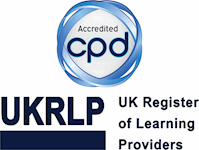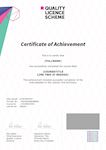Forensic Accounting Diploma
Diploma QLS Level 5 | *FREE PDF Certificate* Tutor Support & Exam | 120 CPD Credits | Free Accounting Course
Staff Training Solutions
Summary
- Exam(s) / assessment(s) is included in price
- Tutor is available to students
Overview
Forensic Accounting Level 5 Diploma
Certificate of achievement in Forensic Accounting QLS Level 5. Additional CPD Accredited Certificate with 120 CPD points available with no extra study. The course comes with easy to understand e-learning study materials.
Endorsed Forensic Accounting Certificate of Achievement. This exclusive Level 5 Diploma in Forensic Accounting is our most advanced course to date. Study a comprehensive overview of the Forensic Accounting Level 5 Diploma profession, along with its importance from a contemporary business perspective and the everyday duties of forensic accountants. Key topics covered include fraud detection techniques, how to effectively prevent fraud, evidence gathering and presentation, the growing threat of cyber-crime and many more besides. Study Forensic Accounting in your own time and at your own pace, with the help and support of your own personally-assigned tutor from start to finish!
Qualified and capable Forensic Accountants dedicate their careers to the detection and prevention of fraud at all levels. An immensely important role of extreme responsibility, Forensic Accountants proactively monitor and analyse complex financial data for signs of fraudulent activity. Where detected, they also investigate, gather evidence, prepare cases and pursue prosecution. Elite Forensic Accountants routinely save businesses from dramatic and ongoing losses at the hands of criminals.
Forensic Accounting Level 5 Diploma
Our exclusive Forensic Accounting instills learners with the knowledge, skills and confidence required to pursue rewarding careers in high-level fraud-detection and prevention.
Quality Licence Scheme
This course is endorsed by the Quality Licence Scheme. The Quality Licence Scheme, endorses high-quality, non-regulated provision and training programmes.
Achievement
CPD
Course media
Description
Forensic Accounting Level 5 Diploma
Whichever way you look at it, there has never been a better time to study Forensic Accounting. As the threat of financial fraud grows and intensifies like never before, businesses worldwide are becoming increasingly reliant on qualified and capable forensic accountants. Both in public and private sector environments alike, it’s the responsibility of the forensic accountant to detect fraudulent activity and safeguard the best interests of the business. If looking to build an energising, inspiring and rewarding career for life, the field of Forensic Accounting is wide open!
Forensic Accounting - Course Benefits
When studying for a fully-endorsed Forensic Accounting with STS Courses, every learner benefits from:
- The most comprehensive introduction to the Forensic Accounting profession, along with its role and importance in a wider business context.
- Flexible online learning with absolutely no deadlines or time restrictions to worry about – study in your own time and at your own pace.
- No geographical restrictions – our courses are open to ambitious candidates on a global basis.
- Full 24/7 access to our exclusive digital learning platform and comprehensive support from your personally-assigned tutor.
- The opportunity to study at home for an internationally-recognized forensic accountancy qualification that could transform your career.
Forensic Accounting - Learning Objectives
This advanced Diploma in Forensic Accounting covers every essential practical skill and theoretical concept the learner must master to join this highly-competitive industry. Upon completion of the Forensic Accounting course, candidates will have the opportunity to pursue professional positions in key areas of Forensic Accounting, or begin establishing their own consultancies from scratch. Ultimately, the objective of the Forensic Accounting course is to assist learners with their transition from enthusiastic newcomer to fully-qualified and employed professional.
Over the course of 12 intensive modules, candidates explore the primary responsibilities and daily duties of the working Forensic Accountant. A range of crucial fraud-detection methods are investigated, along with effective evidence-gathering techniques, the growing threat cyber-crime poses to organisations at all levels and the importance of proactive fraud-prevention. The Forensic Accounting course also covers the role of the Forensic Accountant as part of a wider fraud-prevention team.
Upon successful completion of this Forensic Accounting course, candidates take away the most essential industry-specific skills, talents and knowledge including:
- A detailed understanding of the Forensic Accountancy profession
- How forensic accountants protect businesses from loss and damage
- Advanced understanding of common fraud techniques/patterns
- An understanding of the mindset and psychology of the fraudster
- Extensive knowledge of investigative and evidence-gathering processes
- The confidence to build and present a case upon detection of fraud
- Advanced knowledge of cyber-crime and related technology issues
- The opportunity to step into a professional position for the first time
Forensic Accounting - Course Outline
This advanced yet accessible Forensic Accountancy Diploma is delivered across 12 intensive modules – each concluding with an online assessment to verify your acquired knowledge and competencies. Comprehensive support and guidance will be provided by your personally-assigned tutor throughout your studies.
Unit 1- Fundamentals of Forensic Accounting
- Brief History of Fraud and the Antifraud Profession
- What Is Fraud?
- Types of Investigation
- Conducting an Investigation
- Forensic Accountants, Fraud Auditors and Financial Auditors
Unit 2- Finance and Corruption
- Interviews
- Best Practices
- Legal Issues
- Body Language
- Eye Language
- Statement Analysis
- Statement Analysis
- SCAN
Unit 3- Characteristics of Fraudsters
- Who Commits Fraud?
- High-Level and Low-Level Thieves
- Victims of Fraud
Unit 4- Tips and Techniques for Detecting and Preventing Fraud
- Prevention Environment
- Corporate Governance Structure
- Tone at the Top
- Realistic Financial Goals
- Policies and Procedures
Unit 5- Procedures for Investigation
- Solvability Factors
- Weighted solvability factors.
- Un-weighted solvability factors.
- Setting the Expectations and Goals
- Develop an Investigative Plan
- Financial Planning
- Personnel Planning
- Technology Planning
- Understanding the Case
- Database Searches
- Trash Collection
Unit 6- Gathering and processing evidence
- Evidence
- Evidence Created by the Forensic Accounting Investigator
- What Kind of Evidence should be Gathered?
Unit 7- Methods of Obtaining audit evidence
- Document Collection
- Sources of Documents
- Document Organization
Unit 8- Interrogating Monetarily Sophisticated Witnesses
- What is an Interview?
- Planning the Interview
- The Interview Process
- Conducting the Interview
- The Cognitive Interview
- Language Matching
- Paralanguage Matching
Unit 9- How to Successfully Conduct Fraud Risk Assessment
- Risk Assessment Factors
- Corporate Environment Factors
- Internal Factors
- Fraud Factors
- Risk Assessment Best Practices
- Risk Management Checklists and Documentation
- Different Entities to Assess
- Measures and Relationships
Unit 10- Preventing Fraud
- Prevention Environment
- Corporate Governance Structure
- Tone at the Top
- Realistic Financial Goals
- Policies and Procedures
- Perception of Detection
- Surveillance
- Anonymous Tips
- Surprise Audits
- Prosecution
- Enforcement of Ethics and Fraud Policies
- Other Prevention Measures
- Fraud Response Team
- Fraud Response Team and SMEs
Unit 11- What is Computer Related Crime?
- What is Computer Forensics?
- The Benefits of Computer Forensics and Data Analysis
- Planning Computer Forensics Engagement
- Objective of a Computer Forensic Engagement
- Where Might Data Reside?
- Execution of the Computer Forensic Engagement
- Examination of the Device(s) to be Collected
- Do the Data Extracted Need to be Normalized or Cleansed?
Unit 12- work in a Forensic Investigation team
- Teaming With Forensic Accounting Investigators
- Forensic Accounting Investigators’ Cooperation with Internal Auditors
- Forensic Accounting Investigators’ Cooperation with External Auditors
- Objectives of All Interested Parties
- Who Should Direct the Investigation and Why?
Who is this course for?
Forensic Accounting Level 5 Diploma
Our fully-endorsed Forensic Accounting is suitable for newcomers to the industry and existing members of the workforce alike. Whether looking to climb the career ladder or exploring an entirely new profession for the first time, a recognised qualification from a fully-endorsed awarding body could make all the difference. From Accountancy workers seeking a new challenge to business owners overseeing their own loss-prevention duties to future entrepreneurs, this exclusive Forensic Accountancy Diploma is packed with extraordinary insights.
We specialise in dynamic, accessible and affordable distance learning opportunities that are open to candidates on a global basis. Study Forensic Accounting in your own time and at your own pace, with the ongoing support of your own personally-assigned tutor from start to finish. All course materials are provided as standard and our innovative digital learning platform can be accessed on a 24/7 basis from anywhere with an Internet connection.
Requirements
Forensic Accounting Level 5
No particular entry requirement
Option 1
Forensic Accounting Diploma QLS Level 5 endorsed by Quality Licence Scheme
Certificate Fee: £120 + postal charges
Option 2
Forensic Accounting Diploma issued by STS
PDF Certificate - FREE
Hard copy - £25 + postal charges
Option 3
CPD Accredited Certificate
(PDF format)=£30
(Hard copy)=£95 + postal charges
*Postage Charges: National £9, International £15
Career path
Forensic Accounting Level 5 Diploma
Upon successful completion of our Forensic Accounting, candidates may choose to pursue an extensive range of careers including:
- External Auditor
- Financial Analyst
- Financial Assurance Manager
- Financial Assurance Specialist
- Forensic Accountant
- Information Technology Auditor
- Internal Auditor
- Senior Auditor
- Senior Budget Analyst
- Tax Accountant
- Tax Specialist
Questions and answers
Level 5 - two question; can i complete this course within 4 months. And is this course certified by the IFA - inst. Financial accountants. Thank you.
Answer:Dear S. Islam, Yes, you can complete the < Forensic Accounting > course in 4 months. There are no fixed timetables or specific dates for the submission of assignments. All depends on how much time you dedicate to your studies. On course completion, you can claim an accredited certificate issued by IFA after paying the accreditation fee.
This was helpful.
Reviews
Legal information
This course is advertised on reed.co.uk by the Course Provider, whose terms and conditions apply. Purchases are made directly from the Course Provider, and as such, content and materials are supplied by the Course Provider directly. Reed is acting as agent and not reseller in relation to this course. Reed's only responsibility is to facilitate your payment for the course. It is your responsibility to review and agree to the Course Provider's terms and conditions and satisfy yourself as to the suitability of the course you intend to purchase. Reed will not have any responsibility for the content of the course and/or associated materials.




